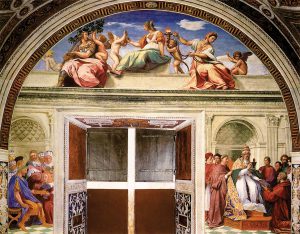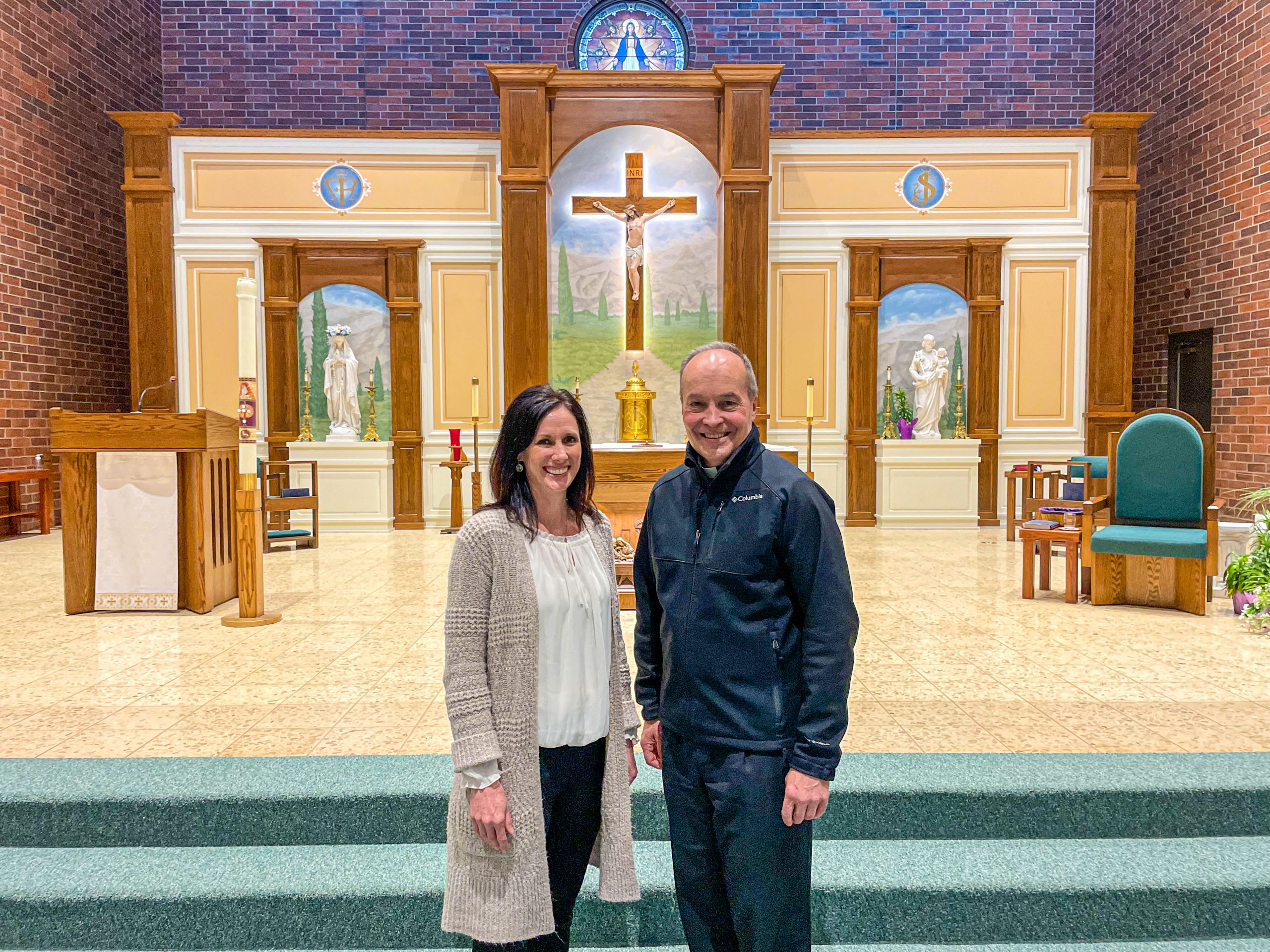
By Jake Geis
As a species, we’re not super keen on change. To a certain degree there’s prudence in this—if it ain’t broke, you don’t fix it. Yet, adaptability and fluidity are cornerstones of remaining relevant, and to survival. While staying deeply rooted in our core values is critical, plants, for example, that cannot grow towards the sunlight are smothered by the competing weeds that surround them.
This principle applies not only to plants, but also to animals, people and even parishes.
A pioneering spirit, willing to take risks for the new evangelization, is the only way we will preserve and then grow the Church. While we strive for this to be a path of continuous improvement, the truth is that change may open us to unintended, gut-wrenching consequences. But within the sifting process of strife, there may be golden nuggets that emerge and radiate with splendid beauty.
How every parish navigates the challenges of this apostolic, post-Christendom era will be as unique as you and I are from each other. These individual approaches are colored with the highs and lows associated with the decisions made. The following account illustrates the path taken by one parish in our diocese.
Parish life prior to Covid
By all accounts, parish life at Immaculate Conception Parish in Watertown was cruising along smoothly. Parishioners attended a host of prayer groups, youth catechism classes were full, large events drew crowds of 300 plus, and you had to show up early to get a decent seat for Sunday Mass. Father Richard Fox, the current pastor, credits the hard work and wisdom of preceding priests for growing the parish into a vibrant faith community.
However, he and Missy Baumberger, the parish director of adult faith formation at that time and current director of missionary discipleship, made a key observation. The crowd at every parish function was populated with familiar faces. After years of expansion, the parish growth had plateaued.
“People started to get comfortable to come to these events,” Missy explained. “They were satisfied with what we were giving them.”
Upon prayer and reflection, Father Fox identified a metaphor to explain the parish’s situation. Though he received much feedback indicating parishioners felt well-fed in their faith, he said, “There’s a difference between eating and being well-fed, and being a cook that knows how to make good-tasting food and desires to serve it to others.”
In short, the parish couldn’t grow again unless it sparked a renewed missionary spirit.
A specific incident heightened interest in this new direction. A Lutheran friend of a parishioner was invited to attend a parish event. While at first skeptical of coming to a Catholic event, after experiencing the unique aspects of our faith, the friend found the Church fascinating and wanted to learn more. This was the catalyst for further thought—what could Immaculate Conception Parish do to showcase the genius of Catholicism to a wider audience?
While the parish leadership brainstormed ideas, another storm was brewing that would change our lives forever. This was March of 2020, and with the cloud of the Covid pandemic enveloping the entire world right down to Watertown, South Dakota, some of these ideas hit the backburner. In the months while the Sioux Falls diocese held no publicly attended Masses, the first of several changes began.
Investing in the staff
With the church all but vacant through the week, thoughts turned to whom could the parish minister to? While searching online for ideas, Missy came upon an answer. A video encouraged parishes to use this time to build up their staff, so that when restrictions finally were removed, the staff could be more capable of ministering to the parish at large.
Under the leadership of Father Fox, group prayer multiple times per day became a feature of the staff. Whether in person or through remote technology, all members assembled for prayer three times per day, with the focus being a meditation on the Divine Mercy Chaplet at 3 p.m.
“I came to realize that the staff itself needed to become the Church in miniature to lead this parish,” Father Fox explained. “The challenge was forming a staff that could ‘love beyond our wounds’ and see each other as Christ does. We need to be a more authentic team of disciples, to better witness true community to the parish.”
In addition to prayer to create this culture, the staff began to share more of their deeper thoughts and emotions with each other, allowing their vulnerabilities to be exposed in a loving, Christ-centered environment. This led to a flowering of trust that was capable of traversing the Covid challenges. After the Covid restrictions slowly lifted, this mentality was furthered by moving all the staff offices to the same area of the building, rather than having them scattered in a wider area as separate silos.
Shifting towards an evangelical mindset
The lifting of restrictions allowed the conversations about that missionary spirit to reawaken. And the timing felt right. “Covid gave us the opportunity to see the world was hungry and searching,” Missy said.
The idea to share the only true satisfaction for this hunger, our Catholic faith, magnified in the minds of the staff. The problem was, as Missy put it, that “so many of us didn’t have either the desire or skills to be missionary disciples.”
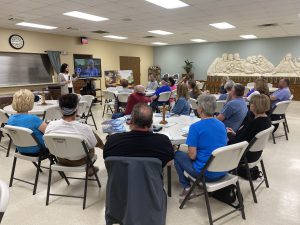
To address this, Missy scoured the web for programs on evangelization. Out of all the available options, the staff selected “The 99” series from Ascension Press. It had two facets, both of which the parish would use. The first, entitled “The 99 Experience,” was targeted to the parish at large. It featured eight videos that helped participants identify their story and how sharing that story allowed them to become witnesses. The message had power, as it inspired one of the attendees to return to confession for the first time in 20 years.
The second component, “The 99 Masterclass,” offered in-depth training for people in leadership roles in the parish. The staff invited a dozen parishioners who were current volunteer leaders of various groups in the parish. In the original goal, the program would be completed in six sessions, just in time for the dozen to aid in “The 99 Experience” for the parish at large.
However, in the first few sessions, Missy sensed a problem. The 12 partakers, even though very connected in their faith, were oddly quiet and uncomfortable with the material. Several expressed a desire to leave the program early. Addressing the elephant in the room, Missy stopped the class and asked the group to express their concerns. They responded that the program was moving too fast, and they couldn’t process everything that was being asked of them.
“Missy then came to me and asked to extend the program from six weeks to a full year,” Father Fox said. “At first, I thought that was a lot of time to invest in just 12 people, but then I realized that this is exactly what Jesus did for three years!”
At the next session, Missy and Father Fox offered to slow the pace of the program to a year and dig deeper into the group’s concerns. With the door now opened, the sources of tension came to light.
“Everyone said they didn’t feel capable of being a missionary,” Missy explained. “Through the program they realized they were not just sharing the faith as a missionary; they were sharing themselves.”
“They saw the risk, the danger of sharing the faith and themselves more personally,” Father Fox added. “The participants also stated they didn’t feel equipped or worthy to do this. They felt this job was only for exceptional people.”
To assuage their fears, Missy brought copies of St. John Paul II’s letters on how the laity are called to transform the world in the new evangelization. Armed with this information, the participants gained confidence in themselves and the mission being introduced in the masterclass program. All but one member stuck it out for the year, and as an added bonus, a participant in “The 99 Experience,” being enthralled in the concept, jumped into the masterclass as a replacement.
Salvaging success from near failure brought valuable lessons.
“We learned that there are no cookie-cutter programs in discipleship,” Missy explained. “We needed to look at each person and each group as an individual, with unique needs.”
It also highlighted the importance of challenges in growing the faith. “If you’re not changing lives,” she said, “then there’s no purpose.”
Diverging paths in youth formation
Building upon the success of “The 99” series, the staff at Immaculate Conception embarked on an ambitious program for the fall of 2021 involving youth ministry.
“Our staff attended a diocesan retreat at the Abbey of the Hills that showed 85 percent of Catholic youth leave the faith during their high school or college years,” Father Fox said. “So I asked myself, if what we have been doing no longer works, what can we do differently to change this?”
“‘The 99 Masterclass’ taught us a lot,” Missy continued, “If a dozen of our parish leaders didn’t feel prepared to share the faith, our youth’s parents likely felt the same way. We were also unsure what we would do if Covid forced us to lock down again.”
This led to the idea to change religious education for the youth from a classroom-based system to a family-based system. Father Fox informed the parish of the new program and expounded upon the key tenets in a series of homilies.
The new program began with parents and children meeting at the church the first Wednesday of each month. After a parish meal, children left for classroom instruction while parents remained for religious information, faith formation and to provide feedback to the parish staff on their concerns and insights. The evening concluded with adoration.
Materials were sent home with the parents for them to instruct their children during the remaining three weeks of the month. To support parents, mentors were available at the church the second and fourth Wednesdays of the month. A parish-wide speaker/supper occupied the third Wednesday.
This change resulted in divergent outcomes. For some families, this style was a blessing.
“Before this program, I was terrified by how the secular culture was pressing down on my home,” explained Kalina Sternhagen. She and her husband Dan are parents of two children in the program, Alanna and Brody. “I taught CCD before, but I found I wasn’t as equipped as I thought I would be to do this. We realized that this wasn’t just teaching, it was a lifestyle change. It changed our priorities, how we speak to each other and how we parent together. It brought peace to our home.”
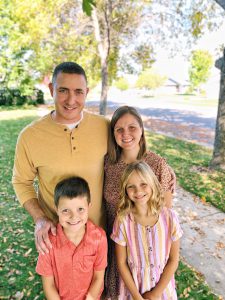
Kalina’s example of this shift came from a school Mother’s Day project Brody brought home. The assignment was to make a list of his mother’s favorite things. “The list said ‘Mom’s favorite thing is God,’” Kalina said. “That would not have happened before this program.”
Kalina’s views are echoed by Jim and Michelle McCormick. They are the parents of Christopher, Grace and Joe. When they started family-based religious education, they became more involved in their kids’ lives.
“We now had a finger on the pulse of our kids’ faith,” Michelle noted. “I believe if we [parents] are an active part in growing their faith, it’s easy for them to say ‘this is important.’”
While it involved a significant time commitment and tweaks to the program needed to be made as they went along, Jim also found it indispensable.
“There’s growing pains, but we feel the fruit that this program will bear will be well worth it,” Jim said.
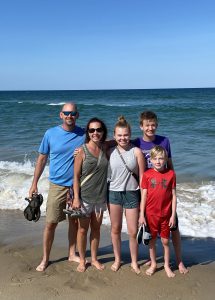
Yet this style of learning was not for every family. First, there were logistical challenges.
“Parents that had children of various ages, such as a 1st, 5th and 9th grader, didn’t know if they should teach three separate lessons or one that spoke at each level,” Father Fox said. “Not addressing that from the outset was a failure on our [he and the staff’s] part.”
Other parents felt the same inadequacies expressed the year prior by the dozen in “The 99 Masterclass.” Though encouraged by the staff, the larger number of parishioners involved with this program made providing the necessary level of individual attention difficult. Other parents felt this approach did not fit the needs of their children’s religious education, preferring the traditional classroom approach.
The combination of these factors led to a significant attrition of families from the program. Reflecting upon this experience, Father Fox and Missy feel the concept is good, but ongoing changes will be made to next year’s program to address the issues. While the inevitable missteps of pioneering weigh heavy on their hearts, the beautiful fruits are worth it.
Challenge for all parishes
This struggle is repeated across our diocese. Parish leaders hoping to evangelize the masses and stem the tide of youth leaving the Church grapple with vexing options every day. Achieving these endeavors will require bold action—action that may look different in every parish. These efforts may yield fruit 100-fold, induce agonizing consequences, or both. But as Teddy Roosevelt said, the credit goes to the “man in the arena,” the one who is willing to fight. So, let’s glove up and be not afraid.


